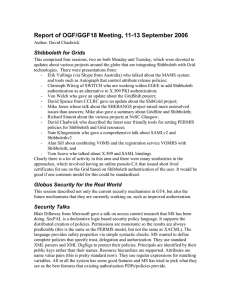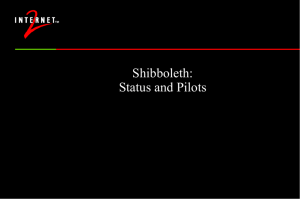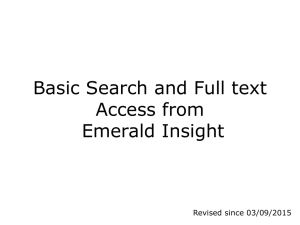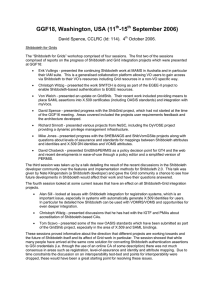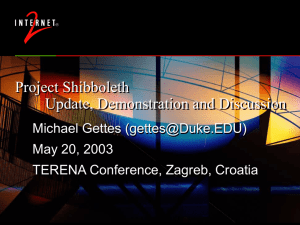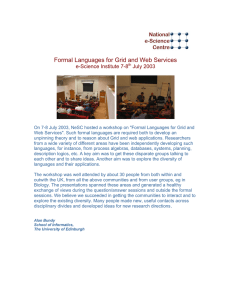GridNet Funding Report: Open Grid Forum 18
advertisement
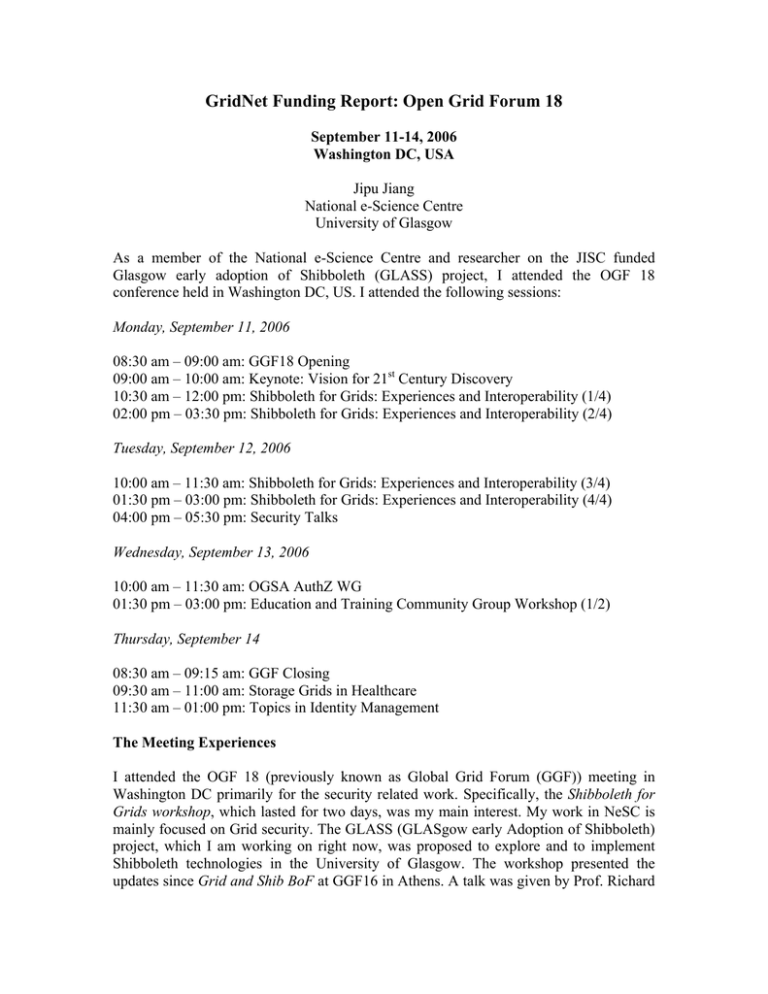
GridNet Funding Report: Open Grid Forum 18 September 11-14, 2006 Washington DC, USA Jipu Jiang National e-Science Centre University of Glasgow As a member of the National e-Science Centre and researcher on the JISC funded Glasgow early adoption of Shibboleth (GLASS) project, I attended the OGF 18 conference held in Washington DC, US. I attended the following sessions: Monday, September 11, 2006 08:30 am – 09:00 am: GGF18 Opening 09:00 am – 10:00 am: Keynote: Vision for 21st Century Discovery 10:30 am – 12:00 pm: Shibboleth for Grids: Experiences and Interoperability (1/4) 02:00 pm – 03:30 pm: Shibboleth for Grids: Experiences and Interoperability (2/4) Tuesday, September 12, 2006 10:00 am – 11:30 am: Shibboleth for Grids: Experiences and Interoperability (3/4) 01:30 pm – 03:00 pm: Shibboleth for Grids: Experiences and Interoperability (4/4) 04:00 pm – 05:30 pm: Security Talks Wednesday, September 13, 2006 10:00 am – 11:30 am: OGSA AuthZ WG 01:30 pm – 03:00 pm: Education and Training Community Group Workshop (1/2) Thursday, September 14 08:30 am – 09:15 am: GGF Closing 09:30 am – 11:00 am: Storage Grids in Healthcare 11:30 am – 01:00 pm: Topics in Identity Management The Meeting Experiences I attended the OGF 18 (previously known as Global Grid Forum (GGF)) meeting in Washington DC primarily for the security related work. Specifically, the Shibboleth for Grids workshop, which lasted for two days, was my main interest. My work in NeSC is mainly focused on Grid security. The GLASS (GLASgow early Adoption of Shibboleth) project, which I am working on right now, was proposed to explore and to implement Shibboleth technologies in the University of Glasgow. The workshop presented the updates since Grid and Shib BoF at GGF16 in Athens. A talk was given by Prof. Richard Sinnott on behalf of NeSC to introduce the new work we have done in both GLASS and DyVOSE project for adopting Shibboleth technology in the Grid environment. Attendance of this session helped me better understand international Shibboleth related work and related components such as new versions of Shibboleth. During the talks in the Shibboleth for Grid workshop, the most interesting one to me was on the MAMS project from Australia. The group have done a lot of integration work between Shibboleth and the GridSphere Portal framework. They now have a whole set of tools running on the GridSphere portal framework. Although not much their work involves Grid, they really did some impressive explorations in portal and Shibboleth integration. I believe future collaboration with them could greatly improve our work in NeSC. To expand and update my knowledge in the Grid Security field, I attended the Security Talk session right after the 4th Shibboleth for Grid workshop. The delegate, Blair Dillaway, from Microsoft presented an XML-based Assertion Language for security policies called SecPAL. He also gave a interesting demo after the talk. I attended the Education and Training Community Group Workshop. This workshop may well assist me in teaching of the Advanced MSc students - one of my duties in NeSC. As one of the aims of the DyVOSE project, a Grid Computing module was created to provide hands on Grid training to Advanced Computing Science MSc students at the University of Glasgow. The methods learned from the workshop will be very helpful in delivering the course materials to the students. Besides adopting Shibboleth to the University of Glasgow, the GLASS project is also going to use this technology to provide secure access to NHS resources/data. Through collaboration with Glasgow Southern General Hospital, a fine-grained portal is to be built to provide access and usage of brain trauma patient data. To gain better understanding about the Grid technologies in the health domain, I attended the Storage Grids in Healthcare session. I went to the Topics in Identity Management session in the last timeslot of the OGF18. Understanding issues raised in identity management from other people’s experiences is crucial to a success adoption of Shibboleth to the unified account management system in University of Glasgow. To conclude, I found OGF18 to be a wonderful and rewarding opportunity which allowed me to present NeSC related work and understand other people’s work and experience at the same time. I would also hope to continue these efforts in the future.
